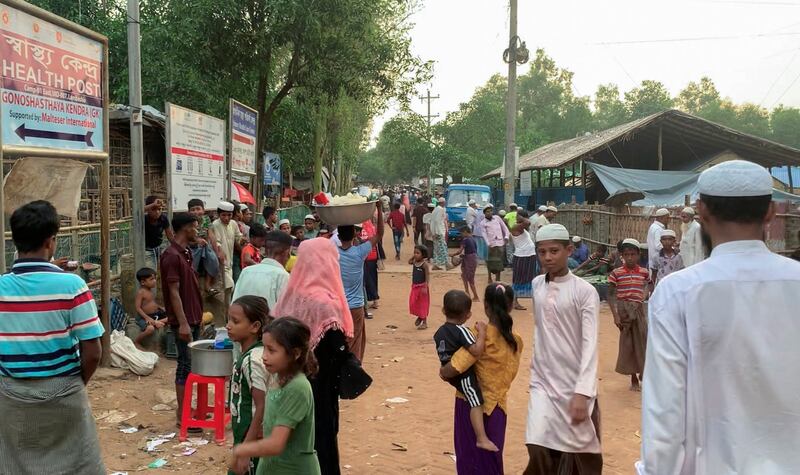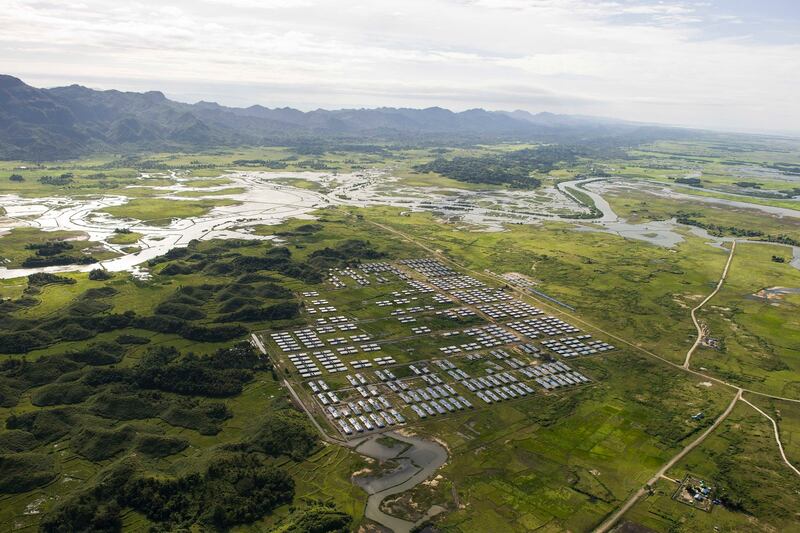Activists and refugees are doubting that a pilot project to repatriate about 1,000 Rohingya refugees from Bangladesh to Myanmar will be successful.
The project, a result of negotiations between Myanmar’s military junta, Bangladesh and China, would bring returnees through two reentry centers in Ngar Khu Ya and Hla Pho Khaung in western Myanmar’s Rakhine state.
But the military junta is really just responding to China’s diplomatic coercion in promoting the pilot project, said Nay San Lwin, an activist and co-founder of the Free Rohingya Coalition. The returnees will likely end up staying in the centers for years, he said.
“The junta is implementing the repatriation program just to look good in the international community, as there was some China-pressure as well,” he said.
Other activists pointed to a lack of political stability in Myanmar, where a military junta has ruled since a coup d’etat in February 2021.
Rohingyas will only return if they can go back to their original locations and are guaranteed the right to citizenship, freedom of travel and equal rights with other ethnicities, a Rohingya living in Cox’s Bazar refugee camp said on condition of anonymity.
“We must get back the farms that we originally had. We must be placed back in our original location,” the source said. “We are ready to return if these requirements are met and if we are treated as equal citizens.”
‘True good will’
The camps in Cox’s Bazar, a southeastern district in Bangladesh that borders Myanmar, house about 1 million of Myanmar’s persecuted Rohingya minority, including about 740,000 who fled following a military crackdown in Rakhine state since August 2017. Myanmar has in the past denied Rohingya freedom of movement, citizenship and access to jobs, health care and education.
Rohingyas sheltering in the camp told Radio Free Asia that they haven’t been notified of the pilot project.
The military junta needs to say how many weeks or months returnees would have to stay in one of the two centers, and where they would be sent afterward, said Khin Maung, director of the Rohingya Youth Association who lives in Cox’s Bazar.
“We are not sure if the military junta is implementing the repatriation program out of its true good will,” he said. “A lot of things depend on that answer.”

When contacted about the program, the junta’s minister of immigration and manpower, Myint Kyaing, referred RFA to the Ministry of Foreign Affairs. The junta’s permanent secretary of the Ministry of Foreign Affairs, Chan Aye, didn’t answer a phone call from RFA.
Military officials gave a tour of the centers to the heads of embassies from ASEAN countries on March 8. Heads of embassies from China, India and Bangladesh also joined the tour.
The returnees would receive assistance through education, livelihood and health programs at the two centers, said Hla Thein, the junta’s attorney general and spokesman for Rakhine state.
Returnees will be accepted based on five points: He or she must have lived in Myanmar. He or she must be a returnee of his or her own volition. Family members who were forced to be separated must be certified by a Bangladeshi court. If a child is born in Bangladesh, both parents must prove that they have lived in Myanmar. The parents also must provide confirmation of this from a Bangladeshi court.
‘Not a sustainable initiative’
A junta readmission team will visit Bangladesh for more talks within a few days, Hla Thein told RFA on Tuesday. The Bangladesh Embassy in Yangon didn’t immediately respond to an email asking about the country’s role in the readmission program.
Bangladesh Foreign Minister A. K. Abdul Momen said the Chinese government has built new houses in some protected areas in Rakhine for the returnees.
“But uncertainties loom, too,” he told BenarNews, an RFA-affiliated news service. “They want to go to their original homes. But the Myanmar authorities say their homesteads have been occupied by the Arakan Army. The places are unsafe.”

Mohammed Mizanur Rahman, Bangladesh’s refugee relief and repatriation commissioner, on Monday said the pilot project likely won’t happen for a while.
“We have been in the process of verification of the Myanmar people. There are more stages of repatriation,” he said.
There were two attempts to re-admit the Rohingyas in 2018 and 2019, with 2,260 candidates designated to return in the first batch and 3,450 in the second batch. But no one returned under the agreement at the time with Bangladesh.
Former Bangladesh foreign secretary Md. Touhid Hossain told BenarNews on Monday that the pilot project wasn’t a workable idea.
“Repatriation through a pilot project is not a sustainable initiative,” he said. “A sustainable repatriation can only be achieved when the 1.1 million refugees would voluntarily return to Myanmar.”
“Settling the Rohingya crisis lies in Myanmar. The responsibility to improve the situation in Rakhine also goes on them. If they do so, the Rohingya would voluntarily return to their homeland,” he said.
Translated by Myo Min Aung. Edited by Matt Reed. Kamran Reza Chowdhury in Dhaka contributed to this report.
